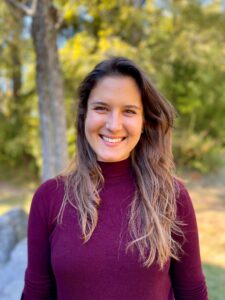GREENEVILLE – Community members can explore religion in Appalachia with a doctoral student at Princeton University who was raised in Greene County when she leads the three sessions of the Theologian-In-Residence series in January at Tusculum University.

Emily Morrell
Emily Morrell, a graduate of Greeneville High School, will present Jan. 12, Jan. 19 and Jan. 26, all Fridays, in Chalmers Conference Center of the Scott M. Niswonger Commons and via Zoom. As is customary, all sessions will begin at 10 a.m. and last about two hours followed by lunch in the Tusculum cafeteria.
The theme for Theologian-In-Residence in 2024 is “Religion in Appalachia: Faith in the Mountains in the Past, Present and Future.”
“We are thrilled to have an impressive young academic who has already accumulated a substantial publishing, presentation, lecture and service portfolio,” said Dr. Chris Shumate, Tusculum’s campus minister. “Emily will provide well-researched and thoughtful presentations that will continue our tradition of providing compelling material at Theologian-In-Residence. We enjoy helping people grow in their faith by participating in this series and look forward to having the community join us again in large numbers.”
To accommodate Morrell’s schedule, Tusculum has moved Theologian-In-Residence from February to January and reduced the number of presentations from four to three. She returns to Princeton in late January to continue her pursuit of a doctorate in religious studies, with the field of study being Religion in the Americas.
Here is a summary from Morrell of her three presentations:
Session 1: The Mountains and Religion – This session will introduce the narrative trajectory of Appalachian history in three distinct periods. Reflecting on that story will lead to a conversation about the story of religion in the mountains, especially Christianity. How did the history of religion in the mountains emerge alongside (and deviate from) the region’s broader story? Is “mountain religion” all there is?
Session 2: The Nitty Gritty of Bread and Justice: The Story of CORA – This session will tell a different story of religion in the mountains through the history of the Commission on Religion in Appalachia. CORA, a war on poverty-era organization, demonstrated a shift in public theology that merged community voices and regional justice movements instead of relying on assumptions about “mountain religion” and snake handling.
Session 3: Pittston and Moss 3: A Case Study in Solidarity – The final session will explore how CORA and other communities of faith played roles in supporting and legitimizing the massive Pittston Coal strike of 1989. The Pittston strike and unique theological arguments around and within it encourage new ways of considering the role of religion and lived theology in the mountains.
“I am looking forward to presenting at Theologian-In-Residence in my home community and discussing these subjects in greater depth,” Morrell said. “Religion in Appalachia has a rich history, and I welcome the opportunity to share what I have learned and hear the perspectives of the audience. This will be a tremendous occasion to examine how religion has shaped life in Appalachia through historical events that still continue to have an impact on people’s lives today and will remain a factor in the future.”
After graduating from Greeneville High, Morrell earned a bachelor’s degree in religious studies and history at Centre College in Danville, Kentucky. She then received a Master of Divinity and a master’s degree in practical theology from Columbia Theological Seminary in Decatur, Georgia, and in history from West Virginia University.
She received a Southern studies pre-dissertation prospectus fellowship in the summer from the University of North Carolina. During her studies at Columbia Theological Seminary, she earned the Fannie Jordan Bryan Fellowship, a grant for further graduate study in theology and religion, and was selected for the Paul T. Fuhrmann Book Prize in Church History, an award for outstanding work in church history. At West Virginia, she won the William D. Barns Graduate Student Award as the outstanding graduate student of regional history.
Morrell has been published five times, and other publications are under review or are being revised. She has completed two reviews and had multiple presentations, public lectures and service opportunities. In summer 2022, she gave the presentation “Who Was John Gloucester?: Race, Place, and Religion at Greeneville College in 1806” at Tusculum.
“Tusculum has proudly hosted Theologian-in-Residence for more than 30 years, and we are pleased with the tremendous community participation,” said Dr. Scott Hummel, the university’s president. “We are excited to have dozens of churches represented in the audience, and their presence contributes to the expression of faith we value at Tusculum. Theologian-In-Residence is a meaningful way for us be civically engaged and encourage faith development in the community and on our campus.”
To reserve a seat at Theologian-In-Residence, please email Dr. Shumate at cshumate@tusculum.edu or register at https://site.tusculum.edu/theologian-in-residence-registration/. Those who will participate via Zoom should indicate that preference, and Dr. Shumate will send the login information.
Attendance at Theologian-In-Residence and participation in lunch after each session is free, but Tusculum welcomes donations to help defray the costs. Anyone who is interested can visit www.tusculum.edu/giving to donate or send a check to the Office of Institutional Advancement at P.O. Box 5040, Greeneville, TN, 37745. Please select Theologian-In-Residence in the dropdown menu for online giving or note it on the check.
Additional information about faith development at Tusculum is available at https://site.tusculum.edu/campus-ministries/. To learn more about the university, please visit www.tusculum.edu.


